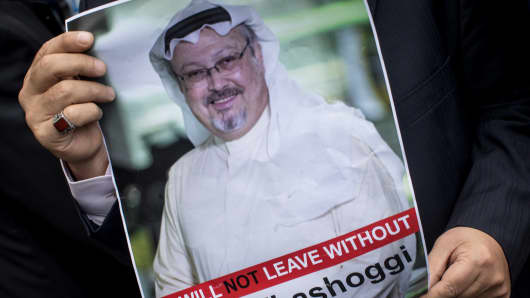Missing journalist Jamal Khashoggi is dead, Saudi Arabia's general prosecutor said early Saturday morning local time.
The government said that Khashoggi got into a fight with the people he met at the consulate in Istanbul, Turkey on Oct. 2. The kingdom alleged that Khashoggi died in that clash.
That explanation counters multiple reports of how Khashoggi died. Turkish officials told The New York Times that it has audio evidence which proves Khashoggi was tortured, killed and subsequently dismembered by a hit team of Saudi agents.
It also contradicts the Saudi government's earlier account of events. Crown Prince Mohammed bin Salman previously told Bloomberg that the dissident journalist left the consulate shortly after he arrived.
"My understanding is he entered and he got out after a few minutes or one hour. I'm not sure. We are investigating this through the foreign ministry to see exactly what happened at that time," he told Bloomberg at the time.
When asked to confirm that Khashoggi is not inside the consulate, the crown prince told Bloomberg, "Yes, he's not inside."
Chris McGrath | Getty Images News | Getty Images
A man holds a poster of Saudi journalist Jamal Khashoggi during a protest organized by members of the Turkish-Arabic Media Association at the entrance to Saudi Arabia's consulate on October 8, 2018 in Istanbul, Turkey.
The kingdom also fired Deputy Chief of General Intelligence Ahmad bin Hassan Asiri and royal court advisor Abdullah Al-Qahtani. The kingdom also said a committee would be formed to restructure its intelligence agency under the supervision of Prince Mohammed, "to modernize its regulations and define its powers precisely."
On Thursday, The New York Times reported that Saudi officials close to the crown prince planned on blaming Asiri for Khashoggi's death. The Times said by making Asiri a scapegoat, the government could help shield the crown prince from blame.
Through its state press, the kingdom said it has detained 18 Saudi nationals after preliminary investigations linked them to the case.
Saudi Arabia said it "is taking the necessary measures to clarify the circumstances in the case of Saudi citizen Jamal Khashoggi" and that "all those involved will be brought to justice."
White House press secretary Sarah Sanders issued the following statement:
"The United States acknowledges the announcement from the Kingdom of Saudi Arabia that its investigation into the fate of Jamal Khashoggi is progressing and that it has taken action against the suspects it has identified thus far. We will continue to closely follow the international investigations into this tragic incident and advocate for justice that is timely, transparent, and in accordance with all due process. We are saddened to hear confirmation of Mr. Khashoggi's death, and we offer our deepest condolences to his family, fiancée, and friends."
In the weeks following Khashoggi's disappearance, the international community increasingly pressed Saudi Arabia for the dissident's whereabouts. U.S. President Donald Trump also faced mounting criticism for being too soft in his response. On Thursday, Trump acknowledged Khashoggi was likely dead and said he would consider "very severe consequences" if Saudi Arabia is found responsible.
But Trump's resistance to act swiftly sparked comparisons to how he has spoken deferentially about other autocratic leaders accused of human rights abuses, such as Russia's Vladimir Putin and North Korea's Kim Jong Un. On Tuesday, the president told The Associated Press that he saw a case of "you're guilty until proven innocent."
Trump on Friday called the arrests a "good first step." Yet he also mentioned that he would be reluctant to undo arms deals with the kingdom if the U.S. were to slap Saudi Arabia with sanctions over Khashoggi's death.
Vice President Mike Pence said that the U.S. will not "solely rely" on information provided by Saudi Arabia, a longtime U.S. ally in the Middle East.
Several members of Congress have called for swift sanctions on oil-rich Saudi Arabia in the uproar over Khashoggi. Sen. Lindsey Graham, R-S.C., quickly expressed his doubts about the Saudi account of the journalist's death, saying "It's hard to find this latest 'explanation' as credible."
The announcement comes more than two weeks after Khashoggi was last seen in public, entering the Saudi consulate in Istanbul. Khashoggi was a frequent critic of Saudi Arabia's royal family and wrote columns for The Washington Post.
In his last column for the Post, Khashoggi highlighted the need for independent and free press in Arab nations. He said the international community had turned a blind eye to the increasing rate at which Arab governments were silencing the press.
"These actions no longer carry the consequence of a backlash from the international community. Instead, these actions may trigger condemnation quickly followed by silence," Khashoggi wrote.
CNBC.

No comments:
Post a Comment